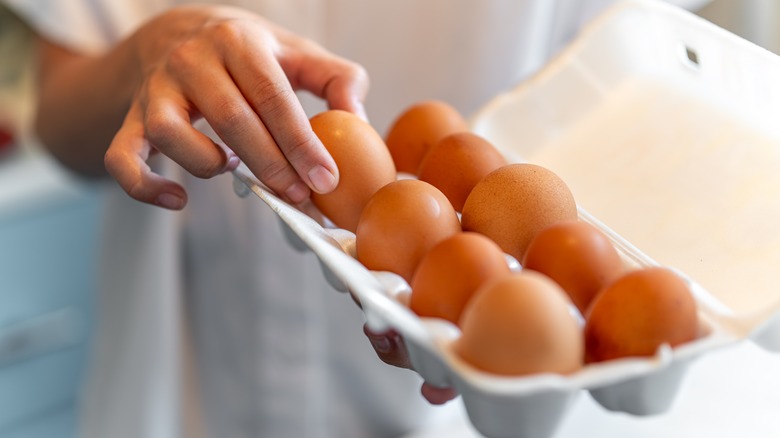Why High Quality Eggs Actually Might Not Be The Best Choice
Have you heard the phrase buy cheap, buy twice? Well, this doesn't necessarily apply to purchasing eggs. There are two main factors to consider when defining an egg's quality: the grade and the label revealing what environment the chickens are kept in. In the U.S., eggs are subject to a worst-to-best quality grading system of B, A, or AA. Interestingly, though, with only a slight difference between Grade AA and A eggs, the best option may not be that higher bracket. Grade A has nearly all of the characteristics of AA, just with reasonably firm rather than fully firm whites. This factor might be irrelevant to a consumer.
In terms of environments, there are five categories: conventional, cage-free, free-range, organic, and pasture-raised. Companies often advertise free-range eggs as ethically high-quality but, in reality, these hens often only receive a small amount of time outdoors. Because of loopholes in guidelines, there's sometimes a minimal difference between even battery-kept and free-range practices. The better choice in this scenario would be pasture-raised, where hens roam all year and get to naturally forage. Plus, foraging gives pastured yolks an intense orange color with boosted omega-3 levels from all the bugs and plants.
When is splurging on high quality eggs worthwhile?
Conscious consumerism is a luxury some can afford. However, everyone should know what they're buying; one of the biggest mistakes to make when using eggs is not understanding the grading system. When baking dishes that require firm egg whites, like meringues or pavlovas, purchasing Grade AA might be worthwhile. Similarly, if appearance is particularly important (for instance, when serving fried eggs in restaurants), spending more for higher quality is a good idea. Otherwise, don't bother paying more for a carton, especially if a recipe suggests scrambling or folding the eggs anyway.
From an ethical viewpoint, it's always worth splurging on pasture-raised. Caged hens spend their entire lives in a space roughly equivalent to an iPad. Traditionally, they also undergo painful procedures to cut off part of their beaks to avoid fighting injuries given their close quarters. Navigating the industry as a consumer can be challenging, but with the right research, you'll find your optimal budget category. Just ensure you're abiding by general tips for choosing high-quality eggs, like checking for shell breakages to avoid bacteria — nobody wants that.

